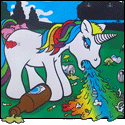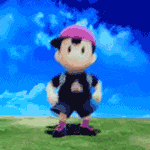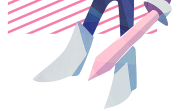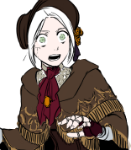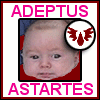- Soonmot
- Dec 19, 2002
-
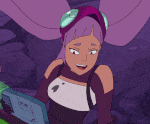
Entrapta fucking loves robots



-
Grimey Drawer
|

quote:
THE MAYFLOWER PROJECT
REMNANTS #1
Prologue
Hannibal’s Carthaginian army had trapped the Romans under Varro in a place called Canae. Before the day was done the Romans would lose seventy-thousand men. Hannibal would lose less than six thousand. It was to become the very model of total destruction, total victory.
Annihilation.
It was the year 216 B.C.
On that same day, in that same year, a comet that had for millions of years traveled a long, cold, looping orbit around the sun slammed into a massive asteroid in orbit between Mars and Jupiter. The impact was so powerful it reduced the comet to dust. It knocked several smaller pieces from the asteroid and nudged them, along with the asteroid itself, from orbit.
The asteroid began a slow spiral that would eventually bring it to a fiery death in the sun. Then, in the same year that Abraham Lincoln freed American slaves, the asteroid had a close encounter with Mars. It missed the planet by several hundred thousand miles but the gravity of Mars swung the asteroid into a faster, steeper descent.
The asteroid would never reach the sun. It had another stop to make.
quote:
DAYS TO IMPACT: 5
CHAPTER 1
“BANG.”
Jobs was fourteen years old, and if this were the year 2010 and not 2011, and if this were not the state of California but, say, the state of Indiana or New York, he would not be driving a car. Alone. All alone.
The technology had come in 2009 with the Ford Libertad!, but laws were slow to change, slower than technology, and so far only Texas, Montana, and in this last year, California, had changed the laws to allow people as young as twelve to be alone in control, more or less, of an actual car.
Jobs’s parents had bought the 2011 model Libertad! with two things in mind: the hideous commute from their home in Carmel northeast to Silicon Valley and Palo Alto, and their quiet, restless, gifted son. The car was yellow. It produced 325 horsepower, which wasn’t bad, though Jobs felt sure he could improve on that given time — the engine was computer-controlled, of course, and Jobs hadn’t met a program he couldn’t improve.
Still, it was his 325 horses. Three-hundred-twenty-five horses and all his on a Saturday midmorning with the fog lifting off the Monterey peninsula and Highway One not too choked with tourists yet.
“Car: Turn on,” Jobs said. The car read his fingerprints from the steering wheel and the engine started. It didn’t make very much noise — it was a hybrid and since the batteries were fully charged, it was running on electric motors at the moment.
“My pleasure, sir,” the car said in a noncommittal feminine voice, and added, “Operation will be in safe mode only.” The car did not sound apologetic. The car sounded, if anything, just a bit doubtful. A hint of uptalk. Jobs could fix that: This was just the default voice. Five other preloaded voices were available: young male, young female, authoritative male, gender nonspecific, and the computer-simulated voice of beloved (and long-dead) actor James Dean — a tie-in to Ford’s ad campaign.
Jobs said, “Car: Destination: South on Highway One, most direct route.”
There was no uptalk in his voice, no caution or question. Jobs could talk to machines. People not so much, but machines, yes. The car opened the garage door, backed down the driveway, bumped out into the street, stopped, turned, and proceeded at the speed limit. Jobs held his breath. It wasn’t that he doubted the technology, no, he’d read about it, understood it, the sensors were all well-tested, the Global Positioning System was backed up
with a fail-safe, the program had run millions of simulations before Ford ever put it into a car. No, he trusted the technology. It was his own emotions he mistrusted. That sense of getting away with something, of being unaccountably free, that’s what made him hold his breath because surely, surely somehow it wasn’t going to last.
And yet, the 325 horses stopped at the stop sign, and proceeded when safe, and took a left, and read the green light, and turned onto the highway, sped up and shifted gears and slipped neatly between a classic nineties-era Beetle and a semi pulling a Wal-Mart trailer. Past a new golf course with sprinklers going, and all at once the Pacific Ocean was revealed. Buttery sunshine, robin’s-egg skies, puffy clouds, a sailboat leaning far over, a warm, dry
breeze coming in the open window, what was not to like? What was less than perfect in all this?
Jobs sat watching the scenery and watching the wheel turn, left, right, passing the Wal-Mart truck. He wanted to drive. He wanted to hold the wheel. That’s what was wrong. He wanted his feet on the pedals and his hands on the wheel. Could he bypass the security protocol?
“No,” he told himself firmly. “No.”
It would be wrong, and worse still, it would be the end of him driving till he was seventeen and could get a license.
“Plus, you don’t know how to drive,” he reminded himself.
Jobs was thin, even bony, average height, with blond hair that looked as if it had been largely ignored, which it had been. There was something puppyish about his body: hands and feet too big, legs too long, as if he had been put together in a hurry from components that didn’t always match up.
He had too-prominent brown eyes that wore a distracted expression, as if they were usually turned inward and only occasionally startled into observing the outside world. His mouth’s default expression was one of tentative near-smile. Like he was planning on smiling but kept forgetting to.
His birth name was Sebastian Andreeson. He’d kept that name until he was seven and read a biography of Steven Jobs. From that point on, he was Jobs.
“Car: Sound system on.”
The stereo came on and defaulted to one of his dad’s files: Green Day? Nirvana? One of those eternally unhappy bands from the nineties. Jobs couldn’t keep track of them. At least it wasn’t his mom’s hip-hop.
“Car: Stereo: Search for opera. Neo, not classic.”
A few second’s delay and the full, rich sound of a tenor singing a popular aria from Molly Folly. It was one of those tunes you couldn’t get away from: hooky, singable, but lyrically prosaic, to Jobs’s ear at least. He was on the point of trying for something different when he recalled: Didn’t Cordelia love Molly Folly? Yes, he remembered, she did. He remembered that.
And the kiss.
The dance. The gym, decorated with streamers and balloons and flatscreens showing slo-mo montages of soaring flight videos. (The theme of the dance was All Can Soar!) He hadn’t come to the dance with Cordelia. He’d wanted to, he’d thought about it, planned it, written several convincing speeches to be delivered to her in a very casual yet totally rehearsed kind of way.
But he hadn’t asked her; she’d gone with her boyfriend. Jobs had been under the impression that she’d broken up with Hondo, but no, they were back together at the dance. So Jobs had gone alone. Even his best friend, Mo’Steel, had a date. He had to be there, no choice, since he was the designated techie running the lights and flatscreens.
On his way to the boys’ room he’d come across Cordelia crying in a gloomy hallway off the gym. He asked why she was crying. She told him. For the next straight hour.
Jobs was a good listener. He listened, without judging or interrupting or trying to exploit the situation to his advantage. (Hondo had done her wrong.) He listened and sympathized and offered a shoulder to cry on, despite the increasingly urgent need to pee. And then, in a strange, tender moment, Cordelia kissed him. Not a brotherly, “thanks for listening” kiss on the cheek, but the real thing. Then, with a rueful smile, she walked away and Jobs ran for the boys’ room.
He remembered every detail. He just wasn’t sure what the details meant. Had he blown his big chance? Had she been all but begging him to become her boyfriend? Had he been just too noble for his own good? Or had he exaggerated the whole thing all out of proportion?
The car swept down the coastal highway, holding at about forty miles an hour, open road ahead now, but twisting and turning. It occurred to Jobs that he should just dial Cordelia up and stun and astound her with the fact that he, he alone, was in the car. No parents. He was the only (or at least one of the very few) ninth graders currently in possession of 325 horsepower.
He could call her up. He could swing by wherever she was and give her a ride. She might respond by saying, “Ever since that night, that lovely, perfect kiss, I’ve been fascinated by you, Jobs. I know you’re like some uber-nerd, but I also sense that deep down inside you hide the soul of a poet. Now, please kiss me again.”
Yep. That’s what would happen.
The music stopped and Jobs realized he hadn’t turned on the content filter. A news broadcast began and before he had a chance to instruct the car to go back to music, he heard something that froze the words unformed in his throat.
“. . . denied the report and said that ‘no credible evidence has yet been presented that Earth is directly imperiled.’”
And with that the broadcast turned to the next story, which involved stock prices.
“Car: Stereo: Previous story, give me the full file, on screen.”
The Libertad! might not have been exactly perfect for a guy who wanted his hands on the wheel and his foot on the pedal, but it was perfect for someone who wanted to read. The story appeared on screen, a compilation of news reports from The New York Times and CNN and WebboScreed.
The original story had come from WebboScreed. The story said that NASA had discovered an approaching asteroid roughly seventy-six miles long on an intercept course with Earth. As he was reading the story a bug popped up to announce an update. This was a CNN story, a more credible source than WebboScreed.
“Car: Stereo: Play the bugged story. Video.”
The screen showed a CNN anchor doing an intro to a piece reported with some skepticism by a field reporter standing out in a marsh near the Kennedy Space Center in Florida. The reporter quoted sources as saying that one of the last of the aging shuttles was being outfitted to carry a sort of Noah’s Ark of selected humans into space so that at least some humans would survive the impact of the rumored asteroid.
CNN went to some lengths to pooh-pooh its own story. There were endless reminders that this was totally unconfirmed, and in fact was being vigorously denied by NASA and the White House. The reporter concluded by suggesting that he, personally, thought the story was baloney.
Jobs cleared the screen.
He took several deep, shaky breaths. Dangerous to automatically believe anything the media said. Unless it was confirmed, backed up, proven. Or unless your mother had been weeping secretly for the last two weeks, giving you and your brother strange, faraway looks filled with muted horror and sadness. And unless that mother was Professor Jennifer Andreeson, head of astrophysics at Stanford. Asteroid. Seventy-six miles long. The asteroid that had eradicated the dinosaurs was what? Jobs searched his memory. Ten miles long? It would be like shooting a bullet into a soft-boiled egg.
“Bang,” Jobs said to the car.
He didn’t know what to do or think. He could call his parents. He could call his little brother, Edward. He could call Cordelia and try to exploit the fact that the world was coming to an end. Or he could call his best friend, Mo’Steel, who would be absolutely no help at all.
“Link: Call Mo.”
And we're off!
Okay, so number 1. We got some names in this book. Wow. Number 2, Jobs has a Something Awful account. Number 3, we're getting right into thing, hell yeah! Also lol at working autodriving cars in 2011
quote:
CHAPTER 2
“YOU DON’T WANT TO BE IN A BODY CAST WHEN IT HAPPENS.”
Mo’Steel had barely slept the night before. He’d barely spoken to anyone, which was unusual. He’d barely formed a coherent thought, which was not at all unusual. He was as excited as it was possible for him to be, and he was capable of becoming very excited.
He was not scared. Not what you’d call really scared. He was totally glandular, definitely hugely adrenalized, but not scared. His friend Jobs had once tried to convince him that fear was the real motivation behind Mo’Steel’s obsessive need for the newest, wildest, most idiotic, most dangerous thrill. But that was Jobs for you: He thought way too much. He wouldn’t say anything for a week, then, when he finally did say something besides, “You gonna eat those fries?” what he said would be something disturbing.
Mo’Steel was hooked onto a semi-enclosed chairlift that moved about five times faster than the usual ski lift. But then this wasn’t a ski lift. This wasn’t skiing. No snow in sight at this altitude, though there was a nice snowcap higher up. The lift was just a sort of hook, really, a bare little seat and a steel ring to hold him in place and a plastic bubble to trap oxygen and a bit of warmth.
His feet hung free. Fifty-foot-tall trees reached up practically to brush the wheels of Mo’Steel’s skates as he skimmed along above them. The birds were all down there, flitting white and gray and russet shapes. He was above the birds.
He twisted in the lift to look back at distant Denver, smoggy and sprawled out at the foot of the mountains. He pitied those people down there. Pitied them because all they were doing was grinding along, stuck on slow, while he was on the edge of the ultimate. He turned away from the city and peered down through the trees again. Here and there he saw sections of The Pipe. The Six Flags over Colorado Skateboggan was the official name, which was just pitiful. They should have known everyone would be calling it The Pipe. Capital T, capital P.
The Pipe was an eight-foot-diameter tube, all blast-glass, Teflon, and neon inside, dull brown-painted aluminum outside. It ran from near the top of Mount Cisco Systems all the way to the bottom: an eleven-thousand-foot drop. But not just a drop, oh no. The Pipe split into four intertwining, interlocking branches, zooming back and forth down the mountain’s face, so that the eleven-thousand-twenty-foot vertical actually ended up being closer to twenty
thousand linear feet.
Twenty thousand feet: three-point-eight miles, give or take. Maximum recorded speed? Seventy-eight miles per hour, compadre. Fast as a car on the interstate, only with no car.
The peak, the launching point, was not far now. Mo’Steel was getting giddy and he wondered for a moment if the oxygen system was working right. Not much air way up here. Not much air but plenty of wind. The little car rocked back and forth, not a bad ride all by itself. What if the cable broke? That could be woolly. Hard-core woolly.
He began to loosen himself up as well as he could. Shoulder roll, leg stretch, oh man, it was going to be supreme.
The voice of the chairlift informed him that he had one minute to blastoff and reminded him to check his equipment.
He slapped the helmet down on his head, made sure it was seated properly. He spun the little wheels set in the edge of his gloves. He kicked his skates together, testing the feel of them. Knee pads, on. Elbow pads, on. Mo’Steel was not a big jock. He was never going to play professional basketball or football — he was too small for either. Not small small, just normal size, and normal size was death in pro sports.
He had broad shoulders and somewhat bowed legs and a concave belly. His face was defined by a wide, smiling mouth and eyes set too far apart for classic good looks. There was a reptilian quality to him, but a nice reptile: a happy lizard with quick movements and sudden grins and long brown hair that bounced every time he yelled. Which was fairly often since Mo’Steel’s normal mode of conversation was a goofy, wild-eyed yell.
He was over the snow now, the almost year-round snow. The wind whipped up seriously, whistling over the mountain’s peak, and pushed freezing tendrils through the chairlift’s heat- glow. They said the inside of The Pipe was warm. And plenty of air, too. That was good because he didn’t want to do this all numb and wheezing. The point was to feel.
The chair cleared a rock ledge and there it was, all at once: The Sink. There could be no other name for it, although the Six Flags people insisted on calling it the American Express Launch Point.
It was The Sink. Capital T, capital S.
It was sixty feet across, a rounded out, perfectly smooth dimple in the top of the mountain, carved into living rock. In the bottom of The Sink was a drain. That drain was the opening of The Pipe. The chair rose, circled, jerked on its cable as it dropped lower.
Time to take the test.
“Lock and load,” Mo’Steel said.
He opened the safety belt and dropped the three feet to the gently sloped upper sink. He could still chicken out if he wanted. He could skate out of The Sink and wait to catch the next downward chair.
Yeah. Right.
Mo’Steel had never bunnied out. He had broken five major bones — four of them so badly that they’d been replaced with either composites or regrown-bone-over-titanium. His left humerus, right clavicle, right tibia, and fibula were artificial.
He was proud of the damage. He’d traded his birth name of Romeo Gonzalez for the name Mo’Steel — either for Man Of Steel or More Steel, he couldn’t quite recall which — right after the spectacularly gross (and painful) tibia-fibula break.
Breaking body parts was acceptable. Going all bunny rabbit was not.
Mo’Steel changed his angle of attack and dropped down, turned, caught a cool centrifugal, then cut down and all at once, no time for second thoughts now, he was in The Pipe. The Pipe took it easy for the first three-hundred feet. Time to catch your breath, psych up, get ready. There were neon bands placed every fifty feet. The color of the neon changed depending on the slope. Here they glowed green. Later they would change to yellow. When you saw red bands flash by you were dropping nearly vertical.
And then, there were the big purple streamers that would warn you of approaching intersections, and the white strobes to let you know you were coming onto an airborne.
A lot to remember when your brain was screaming.
“Green, green, green,” as Mo’Steel got used to The Pipe, got used to the diameter, the unmarred smoothness. He slalomed a little, riding up and down the sides. How fast would he have to be going before he could pull a three-sixty?
Then, all at once it was bye-bye, stomach, and he was blazing down through a blur of yellow.
“Aaaaahhhh! Aaaaahhhh!” he yelled, an expression of purest joy. “Aaaaahhhhh!”
His link rang in his ear.
What? He’d blocked his link, he had definitely blocked his link, and now he was crouched low, beating the air resistance, building speed, and the phone was still deedly-deedling in his ear.
Faster, faster, so fast he could go airborne with a fart. Red lights ahead!
“Yeah! Yeah! Yeah!”
So fast now the wind was vibrating his cheeks, stretching his lips into an oblong “O.” Going red! The red neon was a blur. A smear of blood-light all around him. The link rang again. Distracting, to say the least, when the slightest wrong move would result in his sliding ignominiously down the entire remaining length of The Pipe. Oh, the
humiliation!
Deedly-deedly.
“Argh! Link: Answer already!” he shouted in frustration. Purple streamer. Left or right? Left or right? He tried to remember the simulation he’d had to run through three times and master before he could be allowed to ride The Pipe.
Left. No, right!
A voice in his ear. “Mo, what’s up?”
“Jobs? Aaaaaahhhhhh! Yeah! Yeah!”
“Mo, what are you doing?”
Left, left, left! A sudden, jerking, yellow-neon-three-gee-turn, then a sickening drop into all-red territory and man, he’d only thought he was going fast before. He was falling like a rock, gravity, Mother G had him, falling faster and faster, skates barely touching the tunnel.
“I’m riding The Pipe!” Mo’Steel yelled.
“What? Now?”
He pushed off ever so slightly, did a forward flip, and landed on his glove-wheels. Now he was rocketing along backward while standing (more or less) on his hands. It was perhaps the most deeply satisfying moment of his life.
“Strobes!” Mo’Steel screamed giddily.
“Hey, this is kind of important, Mo.”
Ahead there was a perfect circle of sunlight. Somersault. Upright and he was there before he could take a breath. There and all at once out of the pipe and flying through the air, shouting in glee, yelling, scared, wild, totally adrenal.
The gap was thirty feet. Thirty feet of open, pipeless air. A flash of green and brown and a weirdly long, dream-slow view of blue sky.
The opening of the next segment of pipe was flared wide to allow for windage. Mo’Steel pulled his legs up, raised his toes, spread his arms out like wings and hit the flared lip perfectly.
“Jobs, you have got to do this! Aaaaahhhh! Aaaaahhhh!”
“Mo, listen to me, man: no more broken bones. Take it slow. Something is happening. Something big. You don’t want to be in a body cast when it happens.”
“Aaaaahhhhh! No, no, no yellow, no yellow, give me the red! Give me the red! Gimme RED! What’s happening, Jobs? What big thing?”
“Mo, there’s an asteroid going to hit Earth. I don’t want to ruin your day, but it kind of looks like the world is going to end.”
“Oh, that. Yeah, I knew that. My dad told me. Why do you think he paid for this trip? Is that it?”
A long pause. A peevish, dissatisfied silence. Then, “Yeah, Mo, that’s it.”
“Cool. Aaaaahhhhh! Later.”
So it looks like we'll be getting multiple POVs a book. I like Mo.
|











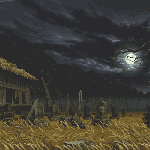

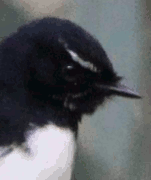
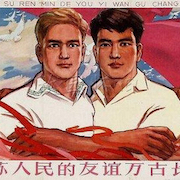
 `
`





